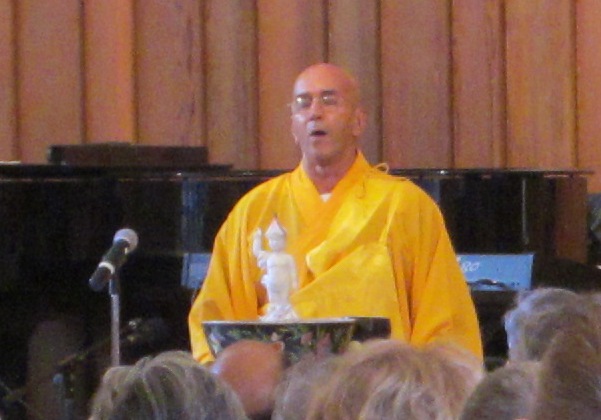Saturday, less than 4 miles from Reliant Stadium and Gov. Rick Perry’s day of prayer and fasting, “The Response,” a prayer service of a very different nature took place. First Unitarian Universalist Church of Houston hosted an “Inclusive Interfaith Prayer Service” that featured an Imam, a Rabbi, a Buddhist Monk and even a Baptist Minister. A moment of silence was set aside to recognize those in attendance who didn’t believe in a higher power, and respect their beliefs.
The Rev. Dr. Daniel O’Connell, senior pastor of First UUC, opened the service by contrasting it with “The Response,” but said that the inclusive interfaith service was not about being critical of people of other faiths: “We come today not to tear down, but to lift up.”
“I come from a particular religious tradition that I cherish, but other hearts are here with hopes and dreams as true and pure as mine,” O’Connell continued, referencing the hymn “A Song of Peace.”
The service continued with a performance by the Bayou City Performing Arts Quartet (made up of members of the Gay Men’s Chorus of Houston and Bayou City Women’s Chorus) and an opening prayer by the Rev. Dr. Jeremy Rutledge, a Baptist minister.
“The Language of Peace,” an instrumental trio that includes cello, keyboard and an Indian instrument known as a “tanpura,” then performed an improvisational piece accompanied by chanting in Hindi.
Chanting was a common element in many of the rituals and prayers performed by the diverse collection of religious leaders. From Rabbi Samantha Kahn’s recitation of a Shabbat morning prayer, to Imam Kemal Civelek’s chanting of the names of God, the service centered on quiet moments of contemplation and meditation. During the “Bathing of the Baby Buddha” ritual performed by the Rev. Seido of the St. Nichiren Buddhist Temple, his rhythmic, breathy chanting filled the air as those assembled ladled water over a statue of a standing infant Buddha.
The Rev. Ellen Cooper Davis of Northwoods Unitarian Universalist Church spoke about her previous life as a circus performer and her current life as a minister. “Actually, the circus was good preparation for working for a church,” said Davis.
“There’s a circus in town right now, but it’s not the kind i want. … It’s the kind that they use to lure the poor people in with bread, the kind the Roman satirists wrote about ages ago,” Cooper Davis said. “They said it’s just there to distract the people so that they would be content with their bread and their circus and would not realize that the Roman empire was oppressing them. So that they would be content with just a few hours of entertainment and not realize that they were living in an empire. The kind of empire that took people who asked hard questions about how we ought to live and nailed them up onto a cross.”
The Rev. Adam Robinson, who organized the service, closed by saying: “This service is about a place at the table for everyone, those [people at “The Response”] are my people. You’re looking an an Evangelical boy here who, after many years, was ordained — then outed — and my place at the table was taken away.
“We’ve got the people out there who are united with hate groups and we don’t want to be united with them,” Robinson said. “We have to watch that — we have to watch our desire to separate ourselves from people we disagree with. It’s a fine line, but if we don’t watch that line carefully pretty soon it’s not OK to be a Unitarian, and then it’s not OK to be a Muslim or a Jew, then it’s not OK to be a progressive Christian, and then there’s only one kind of Christian people are allowed to be.”

















This article was reposted on worldfaith.org and religiousfreedomusa.org